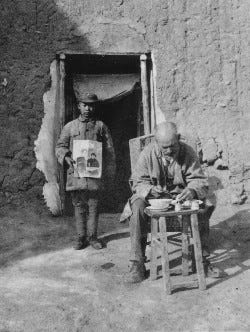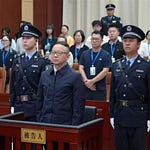He wasn’t Chinese, but he died in China.
He wasn’t a Communist Party member, but Mao Zedong wrote his eulogy.
He was Canadian, but most Canadians today don’t even know his name.
His name was Norman Bethune.
1. Who Was Norman Bethune? From Surgeon to Revolutionary
Born in Ontario in 1890, Norman Bethune was a well-educated Canadian surgeon from a respected Presbyterian family. Early in his career, he was successful, working in top hospitals in Toronto and Montreal, publishing in medical journals, and inventing surgical tools still in use today.
But during the Great Depression of the 1930s, something shifted. He saw how poor people in Canada couldn’t afford medical care. While rich patients got the best treatment, working-class families suffered in silence.
This wasn’t just a medical problem. It was political.
Bethune began to speak out. He wrote and lectured about how capitalism was killing people through neglect. Eventually, he joined the Communist Party of Canada, not as a career move, but out of moral conviction.
He once said:
"Medicine, as we are practicing it, is a luxury trade. We are selling bread at cake prices to people who are starving."
2. From Spain to China: A New Kind of Internationalism
In 1936, Bethune volunteered in the Spanish Civil War. He didn’t go as a soldier, he went to save lives.
He organized mobile blood transfusion units for the anti-fascist Republican army. His work was groundbreaking. But the fall of the Spanish Republic in 1938 left him disillusioned and restless.
That same year, he made an even bolder decision:
He traveled to China to join the Communist-led resistance against the Japanese invasion.
No salary.
No prestige.
No diplomatic protection.
He crossed oceans and war zones to fight for people he had never met.
Why?
Because he believed fascism was not just a European problem.
It was a global threat. And China was fighting for its survival, alone.
3. In the Heart of China’s War: What Bethune Actually Did
Bethune embedded himself with the Chinese Eighth Route Army, working in remote mountain regions under constant Japanese bombardment. Medical supplies were scarce. Conditions were brutal. But he didn’t complain.
Instead, he built mobile surgical units, trained Chinese doctors and nurses, and performed thousands of emergency surgeries near the front lines.
He rarely slept. He often operated for 20 hours straight.
He didn’t treat people based on rank.
He treated whoever needed help, soldiers, villagers, even wounded prisoners.
In 1939, during a surgery on an infected soldier, Bethune accidentally cut his finger. With no antibiotics, the wound turned septic.
He died days later of blood poisoning, on Chinese soil, under a tent, in the middle of war
.
He was 49 years old.
4. Mao Zedong’s Eulogy and “The Bethune Spirit”
When Mao Zedong heard about Bethune’s death, he was deeply moved.
He wrote a eulogy titled "In Memory of Norman Bethune."
Every Chinese child who grew up during the Mao era knows this text. It was mandatory reading in schools for decades.
Mao praised Bethune’s “utter devotion to others without any thought of self,” calling him the embodiment of internationalism.
"He made light of traveling thousands of miles to help us. He risked his life to perform operations on wounded soldiers. He was a man of the noblest character."
To this day, Chinese schools, hospitals, and statues still bear his name.
He is remembered not just as a doctor, but as a moral compass.
5. Forgotten at Home: Why Canada Erased Bethune
While China celebrates him, Canada quietly buried him.
During the Cold War, Bethune was seen as a Communist sympathizer.
His legacy became inconvenient.
You won’t find him in most Canadian history textbooks.
He was erased from the national narrative.
Why?
Because he picked the wrong side in the West’s ideological war.
Because he fought with Mao instead of Chiang Kai-shek.
Because he challenged capitalism instead of defending it.
In recent decades, a few Canadian officials tried to reclaim him. But even today, most Canadians wouldn’t recognize his name unless they’ve visited China.
6. What Bethune Really Stood For
Bethune wasn’t a saint. He had a temper. He drank too much. He clashed with colleagues. But what made him legendary wasn’t perfection. It was courage.
Courage to reject comfort for conviction
Courage to cross oceans for strangers
Courage to believe that medicine should serve humanity, not profit
He wasn’t an “aid worker.” He wasn’t a “volunteer.”
He was a revolutionary who practiced solidarity, not charity.
He didn’t drop medicine from the sky.
He walked into the mud, stood beside the wounded, and bled with them.
7. Why We Need Bethune’s Spirit Today
In a world of calculated interventions and photo-op diplomacy, Bethune reminds us what real internationalism looks like.
Not regime change.
Not color revolutions.
Not “human rights” used as an excuse for invasion.
But one human standing with another, without agenda.
Today, we live in a time where:
Health care is once again a privilege of the rich
War is normalized
Geopolitical alliances matter more than human lives
In this world, Bethune’s spirit is revolutionary all over again.
Conclusion:
Norman Bethune is not just a historical figure.
He’s a mirror.
To China, he reflects the value of foreign solidarity in times of desperation.
To Canada, he reflects the price of political conscience in an era of conformity.
To all of us, he raises a question:
Are we here to serve power, or to serve people?


















Share this post